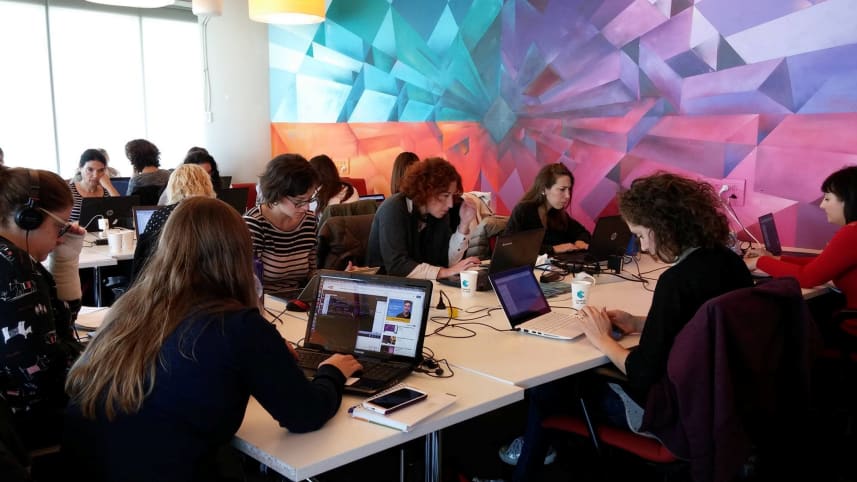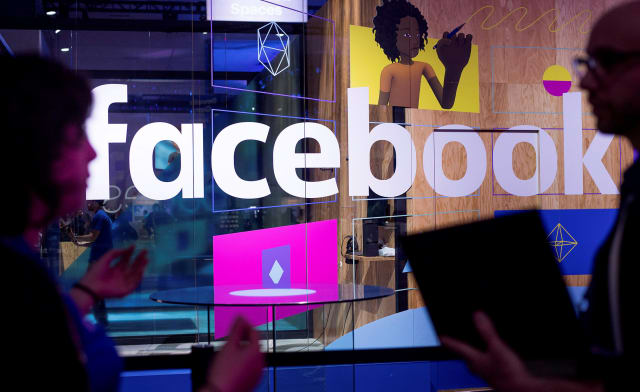

Yael Hallak starts her day at 5 A.M. at home in Tenafly, New Jersey. She writes or reads for two distraction-free hours without a cellphone, laptop or desktop. Just pen and paper by her side.
For that stretch she limits herself to a single task – to delve deeply, to understand, to make progress. Ideas that arise or things that need clarifying make the list she jots down. Hallak is a researcher in the lab of Dan Ariely, a professor of behavioral economics at Duke University and the author of “Predictably Irrational: The Hidden Forces That Shape Our Decisions.” Hallak's research focuses on changing one’s habits.
According to LinkedIn’s “20 big ideas that will change your world in 2020,” number 14 is “your ability to focus will be your most important skill.”
“There’s a lot of talk that it’s unclear what jobs our children will have,” Hallak says. “Not everything is known, but it’s clear that even the most talented workers will be replaced by machines in jobs that consist of repetitive work. In contrast, there’s growing demand for employees capable of producing work with value – jobs that demand extended focus.”
Hallak cites Microsoft’s 2015 research that showed a decline in people’s attention spans. Researchers tracking the brain activity of 112 participants in Canada found that their attention span had shrunk from 12 seconds in 2000 to 8 seconds – shorter than a goldfish’s 9 seconds.
“People say technology made us better at multitasking, but that’s an illusion,” Hallak says. “Basically, what’s happening to us is that we’re moving quickly between different things. These moves take a very clear toll on our ability to delve into the task we’re doing. The fact that we constantly need to be present in all media makes us prefer superficiality over depth.”
She says we’re paying a price for these distractions. “When people are asked to concentrate for three minutes on a task unrelated to the internet, they report that their brain goes in many directions and they’re flooded with thoughts,” she says. “We’ve nearly lost the skill to focus on completing a task.”
Liraz Margalit, who analyzes online consumer behavior at the Interdisciplinary Center Herzliya, says HR managers tend to look for multitaskers, mainly out of a misunderstanding of the way we process information. But another reason is that there is confusion in the labor market between multitasking, intellectual flexibility and the ability to adjust quickly.
“These are distinct abilities,” she says. “People weren’t meant to do several activities at once. Our system isn’t built for it.”
Your brain is confused
Prof. Rony Paz, head of the Weizmann Institute of Science’s Neurobiology Department, notes that despite what we may think, our brain didn’t undergo evolution that lets it function under a burden of stimuli, certainly not of the intensity that digital media creates. “We've learned to cope with certain things better but the brain’s hardware and general programming haven't changed,” he says.
“Maybe our brains will improve in another million years. That’s how long evolution takes; 100 years is nothing. It would be better if my brain could do three things at once, but the question is if you really know how to do several things at once or delude yourself that you can. Many people take on increasingly more things but don’t really manage any of it well.”
As Paz puts it, “Our brain was built to receive positive or negative reinforcements. Once these reinforcements were food or water, for example. Today our brain is inundated by several things, many of which activate the reward system improperly. Small things stimulate the reward system, so we can’t disconnect from WhatsApp or email .... The small rewards confuse the brain, activating a central system, and it’s hard for us to manage that.”
Paz adds that people who can delay gratification have an advantage, referring to the famous experiment by Stanford’s Walter Mischel: Children were promised an extra marshmallow if they didn’t eat the one in front of them before the researchers returned to the room.

Blame the gadget
Many people love to recount how they can divide their attention: They can do several tasks at once and their cellphone, including WhatsApp, social media notifications and other noises, don’t distract them. Many are also confident that if distracted they can refocus, but Margalit of the IDC Herzliya says this is false.
“We work with the phone open and WhatsApp is open next to us, sometimes also on our desktop, and that’s without counting the average of 14 open windows on our computer. It matters,” Margalit says, before describing an experiment to test the affect of digital distractions on productivity.
“They divided people into three groups. The members of the first group had their cellphones next to them. The members of the second group kept their phones in a bag near them. The third group left their phones outside the room.
“The members of the first two groups were asked to ignore the messages constantly being sent to them. All participants were given a passage to read and had to answer questions about it. The findings showed that the first two groups performed far worse than the one without a cellphone in the room.”
Research by online learning platform Udemy in 2018 revealed that 62 percent of workers “spend about an hour per day looking at their phones.” Every time you reach for your device, you’re distracted and you disconnect from your work.
Unsurprisingly, Gen Z and Gen Y do this more than Gen X. The baby boom generation does it least. According to the research, 75 percent of respondents admitted that the farther they got from the distractions, the more productive they were. Margalit says your phone distracts you even if it isn’t sending messages.
“They did the same experiment with the device laid next to the worker,” she says. “The very knowledge that the device could ring is distracting.”
Every time the gadget rings our brain releases dopamine. “Our brain’s number-one goal is not to think rationally or strategically but to create certainty in our lives,” Margalit says.
“We see that dopamine levels are highest when expecting something and decrease substantially when we receive what we expected. It means that every time there’s an alert the excitement over who it could be won’t stop until we check who it is. We can try to ignore it, but cognitively it will keep bothering us until we check.”
Dopamine levels rise in expectation even without a ring. “Most offices are in open spaces; you hear not only your device’s notifications but those of others as well, and it’s almost impossible to concentrate,” she says.
The Google effect
Maybe the brain didn’t change but the way of thinking has. “We see that people who grew up with mobile devices have a copy-paste way of thinking,” Margalit says. They’re great in searching information, scanning and understanding which materials will get them fastest to what they need, but at the expense of processing the information in depth.”
She cites research in which students were asked to learn trivia like who was the third president of the United States and what’s the capital of Malta, and enter them into a computer. Some participants were told they could keep the information on file and access it later. Others were told the data would be erased within an hour. When asked to recall facts, those who believed they could access the data later did much worse.
This phenomenon is called the Google effect: Believing you’ll be able to access information worsens your memory. Hallak says a skill to counter this scourge can be trained like a muscle: At any given moment, dedicate time to one task. The ideal period is 30 minutes, but she recommends starting with three minutes.
“Just focus on one thing, and any time you have to check something, ask a question or send an email, write down what you have to do and go back to it at the end,” she says.
Even if this takes time and practice, it’s important to get to 30 minutes. Hallak also recommends that this be done early in the morning to avoid distractions and to use apps that block instant messages and prevent you from using social media or distractive websites.
Not just the noise
As if coping with smartphones’ dings and dongs and all the other digital distractions weren’t enough, customary work methods both at a company’s offices and among many self-employed people lessen concentration, says Boaz Ronen, a professor emeritus at Tel Aviv University’s Coller School of Management.
“Losing focus and inefficiency is a sickness called bad multitasking – BMT,” he says. For years, people have sold themselves in job interviews as multitaskers, but “we’ve seen in the past decade that multitasking is very bad,” he says.
Bad multitasking reduces productivity by 10 to 30 percent, according to Ronen. “When I work on several things at once and return to what I was doing first, I can’t remember what I was doing,” he says.
Working on two or three jobs is okay, but 11 open tasks simultaneously is very bad,” he adds. “Court cases are heard once every six months, and a judge has dozens or even hundreds of cases weighing on him. It’s bad multitasking, and it’s a bad thing. A programmer who returns after three weeks to something he started doesn’t remember exactly what was there, even if he took notes. It’s the same thing with the judge.”
As Ronen puts it, “It’s one of the main causes of burnout. Anyone who spends months on different things in parallel and returns to them at intervals feels he’s working without a break and the pile of tasks never ends, and he knows he didn’t do a good job. When I try to remember what I did – it’s called mental set-up – it will take 10 minutes at best and usually an hour or 90 minutes. My productivity declines because I’ve worked on this task five or six times without finishing.”
Ronen says the first solution is to train people with low success rates not to perform more than three or four projects or tasks at the same time. The second concerns process: “If you have tasks and your manager gives you more tasks, it will lead you to bad multitasking.”
The right way is to appoint a “gatekeeper” to ensure that there will be a controlled number of tasks in every system and for every individual. “They make sure no one gets more than four jobs at a time,” he says.
On the individual level, Ronen recommends the “complete kit” concept – not starting a task before collecting everything you need to do it. In this way you reduce the need to stop and return to the task later. This helps define what’s needed to complete the job. Maybe this delays the start of work on the tasks, but in the end the damage is far less than the damage of start-and-stop work.
